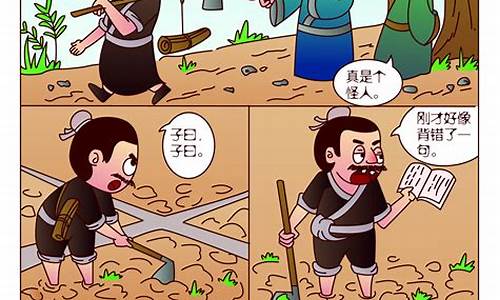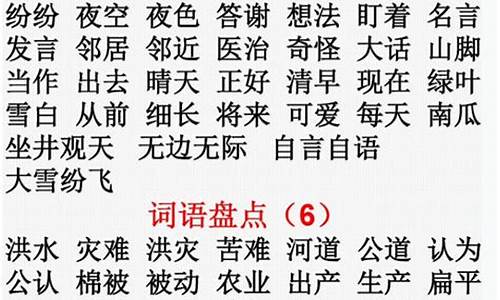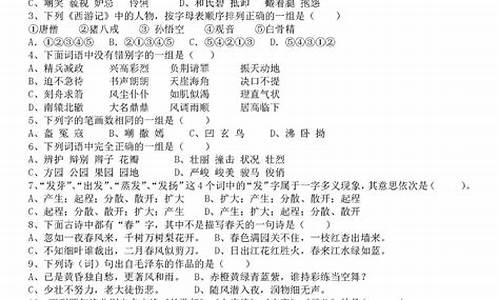您现在的位置是: 首页 > 四字成语 四字成语
中国成语故事英语绘本_中国成语故事英语绘本封面图
ysladmin 2024-05-28 人已围观
简介中国成语故事英语绘本_中国成语故事英语绘本封面图 您好,很高兴能为您介绍一下中国成语故事英语绘本的相关问题。我希望我的回答能够给您带来一些启示和帮助。1.求四个字的成语故事英语的2.求成语故事的英语翻译
您好,很高兴能为您介绍一下中国成语故事英语绘本的相关问题。我希望我的回答能够给您带来一些启示和帮助。
1.求四个字的成语故事英语的
2.求成语故事的英语翻译
3.谁有英语成语故事?~~~(中学水平)
4.英语成语故事 要短一点的 四年级水平 不许抄别人的 包括百度里的
5.小学一年级英语成语故事
6.经典英语成语故事及翻译(五篇)

求四个字的成语故事英语的
英语故事:破镜重圆
A Broken Mirror Joined Together
This set phrase metaphorically means the reunion of husband and wife after an enforced separation or a rupture.
At the end of Southern Dynasties,when the Chen Dynasty was about to be overthrown.
Xú Déyán felt very worried.He foreknew that his wife Princess Lè Chāng was destined to separate from him.
His wife is the last Emperor Chén Shūbǎo's younger sister.
Hence he broke a round bronze mirror into halves.
One half is given to the Princess,the other half left with himself.
The couple agreed on it that the wife would pretend to sell the broked mirror in the street of Cháng'ān,the capital of the Suí Dynasty,on the Lantern Festival.
After the fall of Chén Dynasty,Princess Lè Chāng was captured and sent to Chang'an and forced to be a concubine-servant in the mansion of Yáng Sù.
Xú Déyán missed his wife very much and went to the captial to look for her.
On the 15th day of the first lunar month,he found a man selling half the mirror.
After asking the man,he knew that his wife had been a concubine-servant of Yáng Sù. Thinking that he could not see her again,he sighed a great sorrow.
Having known the matter,Yáng Sù felt much sympathy for the couple.He sent for Xú Déyán and told him to take wife away.Thus the husband and the wife were reunited into a happy couple.
求成语故事的英语翻译
如果觉得学英语觉得枯燥的话,可以加点乐趣的元素进去。我在此献上 英语 故事 ,希望对你有所帮助。成语 寓言故事 :Losing One's Head忘乎所以
The gorillas in the valleys in the south often lived together in groups of several tens. They were fond of drinking wine, and even fonder of imitating man's behavior.
南方山谷里的猩猩,常常数十成群地生活在一起。它们喜欢喝酒,更喜欢模仿人的行为。
People knew very well their habits and often put wine or distiller's grains on the roadside together with many straw sandals connected together with ropes.
人们掌握了它们的习性,经常把酒或酒糟放在路边,旁边又放着许多草鞋,草鞋用绳索连接起来。
The gorillas knew this was a trick to lure them into traps and cursed:
猩猩知道这是人们引诱它们上当,便破口大骂:
"Humph! Do you think we don't know your tricks? We'll never be taken in!"
?哼!你们以为我们不知道吗?我们决不上你们的当!?
So they called one another, turned round and left.
于是,互相招呼,回头就走。
But they had already smelled the aroma of the wine, and couldn't bear to part with it. Even after they left, they would turn their heads to look back. When they saw no one there, they would turn back; and after they turned back, they were afraid of being deceived, and left again. After much hesitation, they finally said to themselves:
但是,它们已经闻到了酒香,总有点恋恋不舍,就是走了,也要回过头来望望。回头望不见人,便又转过来;转过来了又怕上当,再返身回去。犹豫了好久,它们最后自言自语地说:
"Just for a taste of the wine. It won't matter as long as we don't get drunk."
?去尝尝味道,不喝醉就不碍事。?
Shortly afterwards, they agreed to come back to drink the wine. When they got drunk, they forgot everything. Every gorilla put on the straw sandals and imitated the way man walks.
不一会儿,大家同意了,都回来喝酒。等到喝醉的时候,它们一切都忘记了,一个个穿上草鞋,学着人走路。
As a result, they fell down one after another and were all caught alive by people.
结果,一个个都跌倒了,统统被人活捉。
成语寓言故事:A Half Day's Leisure半日清闲
One day, a high official wanted to amuse himself in a temple.
一天,有一个大官,要到寺院里去游玩。
His subordinates notified the monks in the temple three days in advance to prepare a good meal on time. So all the monks in the temple busied themselves with the preparation.
他的手下人便在三天前就通知寺院里的和尚,准时备好饭菜。于是,寺院里所有的和尚,都忙着张罗了起来。
The temple was situated in a remote mountain, surrounded by bamboo groves, and very tranquil. After the high official had strolled about for a while, he was very pleased. While dining, he recited lines from a poem of the Tang Dynasty:
寺院坐落在深山里,四面都是竹林,的确非常清静。大官游玩了一番之后,非常高兴,一面吃饭,一面吟起了唐人的诗句:
"Passing through the bamboo courtyard and meeting a monk,A half day's leisure is gained in this fleeting life."
?因过竹院逢僧话,又得浮生半日闲。?
When the old monk heard these lines of the poem, he couldn't help laughing.
老和尚听了诗句,不觉笑了起来。
The high official asked hastily:
大官连忙问道:
"What are you laughing about?"
?你笑什么?
The old monk replied:
老和尚回答道:
"Your Honour have indeed gained a half day's leisure, but I have been busy for three whole days."
?您老人家固然清闲了半天,可是我老和尚却已经忙了整整三天!?
成语寓言故事:The Kingfisher Moves Its Nest翠鸟迁巢
In order to avoid calamities, at first the kingfisher always selects a high place to build its nest.
翠鸟起先为了避免灾祸,总是选择高的地方筑巢。
But when the young birds are hatched, it will move to a place a little lower to build its nest. This is because the kingfisher is particularly fond of its offspring and is afraid they而ght fall down from a high place.
但是,等到孵出小鸟以后,它就到少许低一点儿的地方筑巢。这是因为它特别爱护小鸟,生怕它们从高处摔下来。
When the young birds grow beautiful feathers, the kingfisher will become even fonder of them and more protective, so it will move its nest further downward, with the result that the young birds are easily taken away by people.
等到小鸟长出了美丽的羽毛以后,母鸟就更加喜欢和爱护它们了,于是又向下搬巢,结果小翠鸟却被人们轻而易举地掏走了。
谁有英语成语故事?~~~(中学水平)
英语成语故事-井底之蛙
The Frog in the Shallow Well (Jing Di Zhi Wa)
Have you not heard of the frog that lived in a shallow well? It said to a turtle that lived in the East Sea, "I am so happy! When I go out, I jump about on the railing beside the mouth of the well. When I come home, I rest in the holes on the broken wall of the well. If I jump into the water, it comes up to my armpits and holds up my cheeks. If I walk in the mud, it covers up my feet. I look around at the wriggly worms, crabs and tadpoles, and none of them can compare with me. Moreover, I am lord of this trough of water and I stand up tall in this shallow well. My happiness is full. My dear sir, why don't you come often and look around my place?"
Before the turtle from the East Sea could get its left foot in the well, its right knee got stuck. It hesitated and retreated. The turtle told the frog about the East Sea.
"Even a distance of a thousand li cannot give you an idea of the sea's width; even a height of a thousand ren cannot give you an idea of its depth. In the time of King Yu of the Xia dynasty, there were floods nine years out of ten, but the waters in the sea did not increase. ln the time of King Tang of the Shang dynasty there were droughts seven years out of eight, but the waters in the sea did not decrease. The sea does not change along with the passage of time and its level does not rise or fall according to the amount of rain that falls. The greatest happiness is to live in the East Sea."
After listening to these words, the frog of the shallow well was shocked into realization of his own insignificance and became very ill at ease.
=============================
英语故事:惊弓之鸟
A Bird Startled by the Mere Twang of a Bow-String
This set phrase figuratively denotes those who have suffered disasters and so have a lingering fear when anything happen.
During the War Period ,in the Wèi State there lived a famous archer named Gēng léi.
One day,Gēng léi and the King of Wei standing on a high terrace saw some birds flying past.
At this Gēng léi said to the King:"I'll shoot a flying bird down for YourMajesty by drawing a bow with no arrow."
The King asked,"Is it possible that one's archery can attain such a level?"
A little later,a wild goose was flying from the east.
Gēng léi just drew his bow but didn't shoot an arrow.
As expected,the wild goose fell to the ground with the twang.
The King asked in surprise,"How can your archery reach such a high level?"
Gēng léi replied ,"This wild goose has been wounded."
The King got more surprised,asking,"How do you know it,sir?"
Gēng léi esplained,"This wild goose flew slowly and cried sadly.Its flying slowly suggested that it was still aching with the old wound; its crying sadly suggested that it had strayed long from its flock.When it heard the twang the wild goose had to flutter hard to fly high for its life.So it is evitably fell down with its old wound burst."
=============================
刻舟求剑
Making His Mark (Ke Zhou Qiu Jian)
A man from the state of Chu was crossing a river. In the boat, his sword fell into the water. Immediately he made a mark on the boat.
"This is where my sword fell off," he said.
When the boat stopped moving, he went into the water to look for his sword at the place where he had marked the boat.
The boat had moved but the sword had not. Is this not a very foolish way to look for a sword
英语成语故事 要短一点的 四年级水平 不许抄别人的 包括百度里的
守株待兔
春秋时代,宋国有个农夫,一天在耕田的时候,忽然跑来一只兔子,恰好碰在树桩上,脖子折断死了。农夫把兔子拾回家去,美美地吃了一顿兔肉。晚上他想:“我何必辛辛苦苦的种地呢?每天在树下能捡到一只兔子就够我吃的了。”于是他从此不再耕种,每天坐在树下等待兔子的到来。
这个成语,讥笑那些不想经过努力,存在侥幸心理,希望得到意外收获的人。
Sitting by a Stump, Waiting for a Careless Hare
In the Spring and Autumn Period, a former in the state of Song was one day working in the fields when he saw a rabbit bump into a tree stump accidentually and break its neck. The former took the rabbit home and cooked himself a delicious meal. That night he thought:"I neednt work so hard. All I have to do is wait for a rabbit each day by the stump." So from then on he gave up farming, and simply sat by the stump waiting for the rabbits to come and run into it.
This idiom satirizes those who just wait for a stroke of luck, rather than making efforts to obtain what they need.
小学一年级英语成语故事
螳螂捕蝉,惊弓之鸟,毛遂自荐,东施效颦,亡羊补牢,掩耳盗铃,画蛇添足,后来居上,南辕北辙,唇亡齿寒,三顾茅庐,黔驴技穷,揠苗助长,滥竽充数,叶公好龙,画龙点睛,画蛇添足,买椟还珠,狐假虎威,走马观花,过河拆桥,愚公移山,害群之马,负荆请罪画蛇添足 掩耳盗铃 亡羊补牢 买椟还珠 守株待兔
经典英语成语故事及翻译(五篇)
⑴ 小学1--6年级所有的成语故事开卷有益 · 博而不精 · 百发百中 · 捕风捉影
· 必恭必敬 · 百感交集 · 兵贵神速 · 杯弓蛇影
· 不寒而栗 · 不合时宜 · 不自量力 · 不拘一格
· 不可多得 · 不堪回首 · 不可救药 · 别开生面
· 不可同日而语 · 不伦不类 · 伯乐相马 · 班门弄斧
· 白面书生 · 八面威风 · 不名一钱 · 拔苗助长
· 不屈不挠 · 不求甚解 · 髀肉复生 · 病入膏肓
· 不入虎穴,不得虎子 · 拔山举鼎 · 博士买驴 · 冰山难靠
· 背水一战 · 半途而废 · 不贪为宝 · 白头如新
· 百闻不如一见 · 不为五斗米折腰 · 抱薪救火 · 标新立异
· 不学无术 · 不入虎穴,不得虎子 · 不远千里 · 不因人热
· 别有天地 · 不遗余力 · 百折不挠 · 百丈竿头
· 不自量力 · 不知所云 · 宾至如归 · 拔帜易帜
· 残杯冷炙 · 寸草春晖 · 草船借箭 · 乘风破浪
· 才高八斗 · 城狐社鼠 · 沧海桑田 · 草菅人命
· 草木皆兵 · 程门立雪 · 长驱直入 · 车水马龙
· 乘兴而来 · 沉鱼落雁 · 乘人之危 · 车载斗量
· 大笔如椽 · 打草惊蛇 · 雕虫小技 · 大材小用
· 多多益善 · 大腹便便 · 大公无私 · 当局者迷
· 大逆不道 · 大器晚成 · 当务之急 · 开诚布公
· 不得要领 · 抛砖引玉 · 二桃杀三士 · 尔虞我诈
· 罚不当罪 · 奋不顾身 · 分崩离析 · 风吹草动
· 覆巢无完卵 · 分道扬镳 · 奉公守法 · 负荆请罪
· 发奸擿伏 · 返老还童 · 发蒙振落 · 风声鹤唳
· 覆水难收 · 赴汤蹈火 · 分庭抗礼 · 防微杜渐
· 负隅顽抗 · 负重致远 · 管鲍之交 · 各得其所
· 感恩图报 · 过河拆桥 · 刮目相看 · 瓜田李下
· 高枕无忧 · 各自为政 · 华而不实 · 好好先生
· 狐假虎威 · 汗流浃背 · 后来居上 · 合浦珠还
· 后起之秀 · 后生可畏 · 火树银花 · 坚壁清野
· 间不容发 · 井底之蛙 · 鸡口牛后 · 江郎才尽
· 见猎心喜 · 鸡鸣狗盗 · 九牛一毛 · 胶漆相投
· 举一反三 · 开诚布公 · 空洞无物 · 沆瀣—气
· 克己奉公 · 开卷有益 · 侃侃而谈 · 口蜜腹剑
· 开门揖盗 · 空前绝后 · 克勤克俭 · 旷日持久
· 困兽犹斗 · 开天辟地 · 口若悬河 · 空中楼阁
· 刻舟求剑 · 脍炙人口 · 狼狈不堪 · 力不从心
· 两败俱伤 · 乐不思蜀 · 老当益壮 · 劳而无功
· 论功行赏 · 老马识途 · 老牛舐犊 · 老妪能解
· 老生常谈 · 梁上君子 · 蓝田生玉 · 滥竽充数
· 狼子野心 · 芒刺在背 · 买椟还珠 · 马革裹尸
· 门可罗雀 · 名落孙山 · 孟母三迁 · 马首是瞻
· 毛遂自荐 · 门庭若市 · 木人石心 · 牛鼎烹鸡
· 怒发冲冠 · 鸟尽弓藏 · 南柯一梦 · 弄巧成拙
· 穷兵黩武 · 宁为玉碎,不为瓦全 · 难兄难弟 · 南辕北辙
· 天真料漫 · 千变万化 · 七步之才 · 庆父不死鲁难未已
· 曲高和寡 · 曲尽其妙 · 千金市骨 · 千钧一发
· 千里鹅毛 · 黔驴技穷 · 千虑一得 · 巧取豪夺
· 七擒七纵 · 杞人忧天 · 曲突徙薪 · 千万买邻
· 犬牙交错 · 千人所指 · 千载难逢 · 气壮山河
· 日不暇给 · 人非圣贤,孰能无过 · 人给家足 · 如火如荼
· 人杰地灵 · 日暮途穷 · 入木三分 · 人琴俱亡
· 人弃我取 · 忍辱负重 · 任人为贤 · 人人自危
· 如释重负 · 入吾彀中 · 人心如面 · 如鱼得水
· 人言可畏 · 孺子可教 · 手不释卷 · 士别三日
· 死不旋踵 · 师出无名 · 三寸之舌 · 水滴石穿
· 死而不朽 · 伤风败俗 · 三顾茅庐 · 双管齐下
· 死灰复燃 · 十行俱下 · 四海之内皆兄弟 · 尸居余气
· 司空见惯 · 水落石出 · 三令五申 · 四面楚歌
· 三迁之教 · 三人成虎 · 杀身成仁 · 水深火热
· 识时务者为俊杰 · 三生有幸 · 尸位素餐 · 塞翁失马
· 上下其手 · 上行下效 · 随月读书 · 守株待兔
· 三折其肱 · 土崩瓦解 · 同仇敌忾 · 同仇敌忾
· 太公钓鱼愿者上钩 · 同甘共苦 · 同工异曲 · 天经地义
· 天下无双 · 天涯海角 · 天衣无缝 · 一夔已足
· 穷兵黩武 · 庄周梦蝶 · 曾参杀人 · 以强凌弱
· 完壁归赵 · 韦编三绝 · 无出其右 · 为虎作伥
· 刎颈之交 · 无可奈何 · 望梅止渴 · 五日京兆
· 危如累卵 · 万死不辞 · 万事俱备只欠东风 · 五色无主
· 亡羊补牢 · 未雨绸缪 · 妄自尊大 · 下笔成章
· 下车泣罪 · 先发制人 · 兴高采烈 · 心旷神怡
· 朽木不雕 · 休戚相关 · 先声夺人 · 小巫见大巫
· 小时了了 · 小心翼翼 · 一败涂地 · 有备无患
· 一不做、二不休 · 一傅众咻 · 一傅众咻 · 以强凌弱
· 饮醇自醉 · 一代楷模 · 一发千钧 · 约法三章
· 以古非今 · 叶公好龙 · 以管窥天 · 言过其实
· 一国三公 · 以规为滇 · 愚公移山 · 一鼓作气
· 一挥而就 · 与虎谋皮 · 异军突起 · 有脚阳春
· 以卵击石 · 以邻为壑 · 夜郎自大 · 一毛不拔
· 一鸣惊人 · 一木难支 · 以貌取人 · 羽毛未丰
· 有名无实 · 一诺千金 · 一暴十寒 · 一窍不通
· 一钱不值 · 予取予求 · 一丘之貉 · 一日千里
· 一日三秋 · 一丝不拘 · 一身是胆 · 以身试法
· 一事无成 · 一网打尽 · 义无反顾 · 一问三不知
· 一误再误 · 月下老人 · 忧心如焚 · 一衣带水
· 一意孤行 · 一叶障目 · 有志竟成 · 一字千金
· 有恃无恐 · 饮鸩止渴 · 自惭形秽 · 专横跋扈
守株待兔:守是 守候、等候 的意思 , “株”是指 露在地面上的树木的根和茎。这个成语的意思是: 守候在树旁,等着捡撞死的兔子。比喻不主动地努力,存着侥幸的心理,希望得到意外的收获。
邯郸学步:故事出自《庄子·秋水》。成语“邯郸学步”,比喻生搬硬套,机械地模仿别人,不但学不到别人的长处,反而会把自己的优点和本领也丢掉。
· 邯郸学步:比喻生搬硬套,机械地模仿别人,不但学不到别人的长处,反而会把自己的优点和本领也丢掉。
· 狐假虎威:狐狸假借老虎的威势。比喻依仗别人的势力欺压人。
· 百发百中: 形容射箭或打枪准确,每次都命中目标。也比喻做事有充分把握。
· 捕风捉影:风和影子都是抓不着的。比喻说话做事丝毫没有事实根据。
· 杞人忧天:杞国有个人怕天塌下来。比喻不必要的或缺乏根据的忧虑和担心。
· 井底之蛙:井底的蛙只能看到井口那么大的一块天。比喻见识狭窄的人。
· 望梅止渴:原意是梅子酸,人想吃梅子就会流涎,因而止渴。后比喻愿望无法实现,用空想安慰自己。
· 杯弓蛇影:将映在酒杯里的弓影误认为蛇。比喻因疑神疑鬼而引起恐惧。
· 郑人买履:用来讽刺只信教条,不顾实际的人。
· 不合时宜:不适合时代形势的需要。也指不合世俗习尚。
· 守株待兔:原比喻希图不经过努力而得到成功的侥幸心理。现也比喻死守狭隘经验,不知变通。
· 愚公移山:比喻坚持不懈地改造自然和坚定不移地进行斗争。
· 曲突徙薪:把烟囱改建成弯的,把灶旁的柴草搬走。比喻事先采取措施,才能防止灾祸。
· 抛砖引玉:抛出砖去,引回玉来。比喻用自己不成熟的意见或作品引出别人更好的意见或好作品。
· 自相矛盾:比喻自己说话做事前后抵触。
· 滥竽充数:比喻无本领的冒充有本领,次货冒充好货。
· 刻舟求剑:比喻不懂事物已发展变化而仍静止地看问题。
· 叶公好龙:比喻口头上说爱好某事物,实际上并不真爱好。
· 亡羊补牢:羊逃跑了再去修补羊圈,还不算晚。比喻出了问题以后想办法补救,可以防止继续受损失。
· 画蛇添足:画蛇时给蛇添上脚。比喻做了多余的事,非但无益,反而不合适。
· 掩耳盗铃:偷铃铛怕别人听见而捂住自己的耳朵。比喻自己欺骗己,明明掩盖不住的事情偏要想法子掩盖。
· 买椟还珠:买下木匣,退还了珍珠。比喻没有眼力,取舍不当
⑵ 适合一年级学生参赛的成语故事有哪些
这些成语故事很多,比如说一些寓言故事还有历史故事。这些都可以的选择一个喜欢的就行。
⑶ 小学一年级英汉双译成语故事:滴水穿石
滴水穿石
水不断下滴,可以闹穿石头。 比喻只要有恒心,不断努力,事情一定成功。专
[拼音]
dī shuǐ chuān shí
[出处属]
宋·罗大经《鹤林玉露·一钱斩吏》:“乖崖援笔判曰:‘一日一钱;千日千钱;绳锯木断;水滴石穿。’”
[例句]
同学们在日常学习中,应该有滴水穿石的精神。
[近义]
水滴石穿 锲而不舍 绳锯木断 孜孜不倦 ...
[反义]
半途而废 浅尝辄止
⑷ 小学一年级英汉双译成语故事:笨鸟先飞
成语来源
The early bird catches the worm
笨鸟先飞
A bird hatches six baby birds.The Sixth is very weak and *** all; his sisters and brothers usually bully him.The other birds usually rob food from his mouth, and the Sixth has to suffer from hunger.
树上一只鸟妈妈孵出了六只鸟宝宝,小六回又瘦又小,哥哥姐姐答们都欺负它;经常从它嘴里抢虫子,小六只得饿着肚子。
Sisters and Brothers call him “clumsy bird.”
哥哥姐姐们都叫他“小笨鸟”。
He determines to exercise more to be healthier, in order to not be laughed by his sisters and brothers.
⑸ 一年级成语故事有哪些
一、坐井观天
在一口废井里,住着一只青蛙。一天,青蛙在井边碰见一只从东海来的海龟。 青蛙自豪地对海鬼夸口说:“你看,我住在这里多么惬意呀!我要高兴,就在井边跳跃游玩,累了就到井壁石洞里休息。
有时把身子舒服地泡在水里,有时愉快地在稀泥中散散步。你看旁边的那些小虫、螃蟹和蝌蚪,它们谁能比得上我呢!我独自占据这口废井,多么自由自在!
先生为什么不经常到井中观赏游玩呢?” 海鬼听了青蛙的一番高谈阔论,就想进入井中看看。可是,它的左脚还没有完全伸进去,右脚就被井栏绊住了。
它只好后退几步,把它看到的大海的情景告诉青蛙:“你见过大海吗?海的广大,岂止千里;海的深度,何止千丈。
古时候,十年里就有九年闹水灾,海水并不因此增多;八年里就有七年闹旱灾,海水却不因此而减少。大海不受旱涝影响,住在广阔无垠的大海里才是真正的快乐。
二、掩耳盗铃
春秋末期,晋国有个叫范吉射的人,家门口挂了一口大钟。在我国古代,钟和铃都是乐器。 一天,有个人到范吉射家里,见到门口的钟,想偷偷地把它背走。但是,钟太笨重了,他根本无法把它背走。后来,终于想出了一个办法:把钟敲碎了,分批拿回去。
于是,他找了一个铁锤,用力去敲钟。“当——”第一下敲上去,钟就发出洪亮悠长的响声;再敲下去,钟发出同样的响声。他想:“钟声一响,人家就知道我在这里敲钟。
这样,钟就要被别人夺走,我也要被人抓住。”于是,他捂住自己的耳朵,这样钟声再响也听不见了,他想既然我离得这么近也听不见,其他人当然更听不见,就可以安全地将钟偷走了。
其实他非常愚蠢可笑:虽然他捂住了耳朵听不见钟声,但别人的耳朵没有被捂住,当然还会听见钟声。 后来,人们就把这个故事概括成“掩耳盗铃”这一成语,来比喻那些自以为是、自欺欺人的人。
三、刻舟求剑
有一个楚国人出门远行。他在乘船过江的时候,一不小心,把随身带着的剑落到江中的急流里去了。船上的人都大叫:“剑掉进水里了! 这个楚国人马上用一把小刀在船舷上刻了个记号,然后回头对大家说:“这是我的剑掉下去的地方。”
众人疑惑不解地望着那个刀刻的印记。有人催促他说:“快下水去找剑呀!” 楚国人说:“慌什么,我有记号呢。”
船继续前行,又有人催他说:“再不下去找剑,这船越走越远,当心找不回来了。” 楚国人依旧自信地说:“不用急,不用急,记号刻在那儿呢。”
直至船行到岸边停下后,这个楚国人才顺着他刻有记号的地方下水去找剑。可是,他怎么能找得到呢。船上刻的那个记号是表示这个楚国人的剑落水瞬间在江水中所处的位置。
掉进江里的剑是不会随着船行走的,而船和船舷上的记号却在不停地前进。等到船行至岸边,船舷上的记号与水中剑的位置早已风马牛不相及了。这个楚国人用上述办法去找他的剑,不是太糊涂了吗?
他在岸边船下的水中,白费了好大一阵工夫,结果毫无所获,还招来了众人的讥笑。 这则故事告诉我们,用静止的眼光去看待不断发展变化的事物,必然要犯脱离实际的主观唯心主义错误。
四、守株待兔
春秋战国时期,宋国有个农夫种着几亩地,他的地头上有一棵大树。一天,他在地里干活,忽然看见一只兔子箭一般地飞奔过来,猛的撞在那棵大树上,一下子把脖子折断了,蹬蹬腿就死了。
这个农夫飞快的跑过去,把兔子捡起来,高兴地说:“这真是一点劲没费,白捡了个大便宜,回去可以美美地吃上一顿了。”
他拎着兔子一边往家走,一边得意地想:“我的运气真好,没准明天还会有兔子跑来,我可不能放过这样的便宜。”
第二天,他到地里,也不干活,只守着那棵大树,等着兔子撞过来。结果,等了一天什么也没等到。
他却不甘心,从此,天天坐在那棵大树下等着兔子来撞死。他等呀等呀,直等到地里的野草长得比庄稼都高了,连个兔子影也没有再见到。
五、亡羊补牢
从前,有个人养了一圈羊。一天早上他准备出去放羊,发现少了一只。原来羊圈破了个窟窿。夜间狼从窟窿里钻进来,把羊叼走了。
邻居劝告他说:"赶快把羊圈修一修,堵上那个窟窿吧!"他说:"羊已经丢了,还修羊圈干什么呢?"没有接受邻居的劝告。
第二天早上,他准备出去放羊,到羊圈里一看,发现又少了一只羊。原来狼又从窟窿里钻进来,把羊叼走了。
他很后悔,不该不接受邻居的劝告,就赶快堵上那个窟窿,把羊圈修补得结结实实。从此,他的羊再也没有被狼叼走的了。
说明:羊丢了,把羊圈修补起来,剩下的羊就不会再丢。犯了错误,立即改正,就能减少错误。遭到失误,及时采取补救措施,则可以避免继续出现的损失。
⑹ 小学一年级英汉双译成语故事:对佟33小学
成语: 狐假虎威
拼音: hú jiǎ hǔ wēi
解释: 假:借。狐狸假借老虎的威势。比喻依仗别人的势力欺压人。
出处: 《战国策·楚策一》:“虎求百兽而食之,得狐。……虎以为然,故遂与之行。兽见之皆走,虎不知兽畏己而走也,以为畏狐也。”
举例造句: 果然府中来借,怎好不借?只怕被别人狐假虎威的诓的去,这个却保不得他。 明·凌濛初《二刻拍案惊奇》卷二十
拼音代码: hjhw
近义词:仗势欺人、狗仗人势
反义词:独步天下、独擅胜场
歇后语: 狐狸跟着老虎走
灯谜: 风顺腋臭浓
用法: 作谓语、定语、宾语;指借机欺压别人
英文:bully people by flaunting one's powerful connections
故事: 很久以前,森林里有只老虎看到一只狐狸就想吃掉它,狐狸大叫:“我是玉帝派来的百兽之王,你如同一起走一走,看看森林里的动物是不是很害怕我。”老虎想也没想就随同前往,果然小动物见了就跑
狐假虎威
[词典] (比喻借别人的威势欺压人)the fox assuming the majesty of the tiger -- borrowing power to do evil;(like)a donkey [an ass] in a lion's hide;a fox masquerading as a tiger;assume someone else's authority as one's own;
[例句]“狐假虎威”这个成语的意思是借着别人的势力去欺压人或吓唬人。
This idiom means relying on another's power to bully or frightenothers.
⑺ 小学一年级英汉双译成语故事:守株待兔
成语故事:宋国有个农夫正在田里翻土。突然,他看见有一只野兔从旁边的草丛里慌慌张张地窜出来,一头撞在田边的树墩子上,便倒在那儿一动也不动了。农民走过去一看:兔子死了。因为它奔跑的速度太快,把脖子都撞折(shé)了。农民高兴极了,他一点力气没花,就白捡了一只又肥又大的野兔。他心想;:要是天天都能捡到野兔,日子就好过了。从此,他再也不肯出力气种地了。每天,他把锄头放在身边,就躺在树墩子跟前,等待着第二只、第三只野兔自己撞到这树墩子上来。世上哪有那么多便宜事啊。农民当然没有再捡到撞死的野兔,而他的田地却荒芜了。因为没能再次得到兔子,农民自己沦为了宋国的笑柄。
英文翻译
During the period of Warring States, many people lived on farming. One day, a farmer found that a hare bumped against a stump and died because it ran so quickly that it did not see the stump. That a hare bumped into the sump was less likely to happen again. However, the farm chose to sit near the stump, waiting for another hare, instead of farming to make a living. Eventually, the farmer starved to death.
Waiting for him
英语成语故事:黔驴技穷
#能力训练# 导语成语在古代汉语与现代汉语的传承上占有重要的地位,它是汉语词汇系统中重要而又极富特色的组成部分。下面是 无 分享的经典英语成语故事及翻译经典英语成语故事及翻译(五篇)。欢迎阅读参考!
1.经典英语成语故事及翻译
卧薪尝胆
During the Spring and Autumn period (770-476BC), the State of Wu launched an attack against the State of Yue. The King of Wu was seriously wounded and soon died. His son Fu Chai became the new King. Fu was determined to get revenge. He drilled his army rigidly until it was a perfect fighting force. Three years later, he led his army against the State of Yue and caught its king Gou Jian. Fu took him to the State of Wu.
春秋时期,吴国和越国之间进行了一场战争,吴王不幸受了重伤,不久就死了。他的儿子夫差作了吴国的新国王,他发誓要替父亲报仇。于是,他严格的操练他的士兵,把他们训练成了一支非常厉害的军队。三年以后,他对越国发动了战争,抓住了越王勾践,把他带回了吴国。
In order to avenge his father's death, Fu let him live in a shabby stone house by his father's tomb and ordered him to raise horses for him. Gou pretended to be loyal to Fu but he never forgot his humiliation. Many years later, he was set free. Gou secretly accumulated a military force after he went back to his own state. In order to make himself tougher he slept on firewood and ate a gall-bladder before having dinner and going to bed every night. At the same time he administered his state carefully, developing agriculture and educating the people. After a few years, his country became strong. Then Gou seized a favorable opportunity to wipe out the State of Wu.
为了复仇,夫差让勾践住在他父亲墓旁的破石屋里天天看墓、喂马。勾践表面上服从,心里面却想着复仇。几年以后,勾践被放回越国。他立刻开始秘密聚集一支军队。为了提醒自己不要忘了报仇,他睡在柴上,还每天在吃饭睡觉前尝一尝苦胆。同时,他专心治理国家,大力发展农业,加强民众教育。几年后,越国又变得强大起来,然后,勾践抓住一个适当的机会消灭了吴国。
Later, people use it to describe one who endures self-imposed hardships to strengthen one's resolve to realize one's ambition.
后来,人们用它来形容人刻苦自励以达到自己定下的目标。
2.经典英语成语故事及翻译
望梅止渴
Quenching Thirst by Watching Plums
One summer, Cao Cao was leading his troops in a punitive expedition against Zhang Xiu. It was extraordinarily hot. The burning sun was like a fire, and the sky was cloudless. The soldiers were walking on the winding mountain paths. The dense forest and the hot rocks exposed to the sun on both sides of the paths made the soldiers feel suffocated. By noontime the soldiers' clothes were wet through with sweat, and the marching speed slowed down. Some solders of weak physique even fainted on the roadside.
Seeing that the marching speed was slower and slower, Cao Cao was very worried because he feared that he might bungle the chance of winning the battle. But how could they quicken their speed? Cao Cao at once callde the guide and asked him on the quiet whether there was a source of water nearby. The guide shook his head, saying that the spring water was on the other side of the mountain, which was very far to have to make a detour to reach. Cao Cao realized that time didn't permit them to make such a detour. After thinking for a moment, he said to the guide, "Keep quiet. I'll find a way out." He knew that it would be to no avail to order his troops to quicken the steps. He had a brain wave and found a good solution. He spurred his horse and came to the head of the column. Pointing his horsewhip to the front, Cao Cao said, "Soldiers, I know there is a big forest of plums ahead. The plums there are both big and delicious. let's hurry along, and we will reach the forest of plums after bypassing this hill." When the solders heard this, they immediately slobbered. Picturing in their minds the sweet and sour flavour of the plums, the soldiers felt as if they were actually eating the plums, the soldiers felt as if they were actually eating the plums themselves. The morale greatly boosted, the soldiers quickened their steps a great deal automatically.
This story comes from "The Fake Tangery" in Anecdotes of This World by Liu Yiqing of the Southern Dynasties period (420-589). From this story, people have derived the set phrase "quenching thirst by watching plums" to refer to trying to comfort oneself of others by idle dreams.
有一年夏天,曹操率领部队去讨伐张绣,天气热得出奇,骄阳似火,天上一丝云彩也没有,部队在弯弯曲曲的山道上行走,两边密密的树木和被阳光晒得滚烫的山石,让人透不过气来。到了中午时分,士兵的衣服都湿透了,行军的速度也慢下来,有几个体弱的士兵竟晕倒在路边。
曹操看行军的速度越来越慢,担心贻误战机,心里很是着急。可是,眼下几万人马连水都喝不上,又怎么能加快速度呢?他立刻叫来向导,悄悄问他:“这附近可有水源?”向导摇摇头说:“泉水在山谷的那一边,要绕道过去还有很远的路程。”曹操想了一下说,“不行,时间来不及。”他看了看前边的树林,沉思了一会儿,对向导说:“你什么也别说,我来想办法。”他知道此刻即使下命令要求部队加快速度也无济于事。脑筋一转,办法来了,他一夹马肚子,快速赶到队伍前面,用马鞭指着前方说:“士兵们,我知道前面有一大片梅林,那里的梅子又大又好吃,我们快点赶路,绕过这个山丘就到梅林了!”士兵们一听,仿佛已经吃到嘴里,精神大振,步伐不由得加快了许多。
故事出自《世说新语?假谲》。成语“望梅止渴”,比喻用空想安慰自己或他人。
3.经典英语成语故事及翻译
一鸣惊人
In the Warring States Period, Duke Wei of Qi neglected state affairs, for the first three years of his reign, giving himself over to dissipation. One of his ministers, Chun Yukun who had a good sense of humour, said to him: 'There is a big bird which has neither taken wing nor sung for three years.' The duke answered, 'Once that bird starts to fly and sing, it will astonish the world.' The duke thereupon devoted himself to his duties and built his state up into a powerful one.
战国时代,齐威王即位后做了三年国君,只顾享乐,不理政事。有个善于说笑话的人叫淳于髡,一天对齐威王说:“城里有一只大鸟,三年不飞也不叫,你知道这是什么道理?”齐威王说:“这鸟不飞则罢,一飞就冲天;不鸣则罢,一鸣就惊人。”在淳于髡的激发下,齐威王开始治理国家,取得很大成绩,齐国的声威一直保持了几十年。
4.经典英语成语故事及翻译
精卫填海
Once upon a time, the youngest daughter of Emperor Yan, legendary ruler of primitive China, went boating on the Eastern Sea. While she was enjoying herself, a strong wind rose on the sea and her boat capsized. Just before she was buried by the surging waves, her spirit turned into a beautiful bird. As it flew over the roaring sea, it cried sadly in the sound "jinwei, jingwei". That was why people called it "Jingwei".
The bird lived on a mountain near the sea. It hated the sea so much that it decided to fill it up. Every day, it flew to and fro between the mountain and the sea, carrying in a twig or a pebble from the mountain and dropping it into the sea.
One day, the roaring sea said to Jingwei, "Poor little bird, stop doing that meaningless thing! You'll never fill me up." Jingwei replied, "I'll fill you up no doubt! I will, even if it'll take me thousands of years! I'll fight on until doomsday!"
The brave little bird kept carrying twigs and pebbles from the mountain to the Eastern Sea without taking a rest.
From this fable comes the idiom "The bird Jingwei trying to fill the sea". We use it to describe people who are firm and indomitable and will not stop until they reach their goal.
从前,炎帝(传说中中国原始社会的统治者)的小女儿在东海上划船。正当她划得高兴时,海面上突然升起一阵大风,把她的小船弄翻了。就在她要被汹涌的波浪吞 没时,她的灵魂变成了一只美丽的小鸟。它飞过那咆哮的海面,伤心的叫着"精卫,精卫"的声音。所以人们就叫她"精卫"。
精卫鸟住在靠海的一座山上。它非常恨大海,所以决心要把它填平。它每天来回于山海之间,把从山上衔来的小树枝和小石子扔在大海里。
一天,咆哮的大海对精卫说:"可怜的小鸟,停止你那无谓的举动吧!你是永远都填不平我的。" 精卫回答说:"我当然会把你填平的!即使这需要千千万万年的时间,我也一定会斗争到底,直到你的末日来临!"
这只勇敢的小鸟继续从山上衔来小树枝和小石子,扔到东海中,从未有片刻休息。
"精卫填海"这个成语就是由这个传说而来的,形容那些坚定不移,不屈不挠,不到目的决不罢休的人。
5.经典英语成语故事及翻译
fail the exam
名落孙山
In the Song Dynasty (宋朝) there was a joker called Sun Shan(孙山).
宋朝有一个很幽默的人,他叫孙山。
One year he went to take the imperialexamination, and came bottomof the listof successfulcandidates.
有一年他去参加考试,公布名单时他是最后一名。
Back in his hometown, one of his neighbor asked him whetherthe neighbor's son had also passed.
回到家,他的邻居向他打听自己的儿子考得怎么样。
Sun Shan said, with a smile:"Sun Shan was the last on the list. Your son came after Sun Shan."
孙山笑着对邻居说:“孙山考了最后一名,你儿子的名字还在孙山的后面呢。”
The peopleused this idiom to indicatefailing in an examination or competition.
人们用“名落孙山”来比喻考试没有考上或者选拔没有被录取。
In ancient times there were no donkeys in Guizhou province. Somebody brought a donkey from somewhere and tied it to a tree at the foot of a mountain.
A tiger saw the donkey, and thought that it must be a fearsome(可怕的) monster. It hide behind a tree and spied on the donkey.
When the donkey brayed(叫) , the tiger was frightened, thinking that the donkey was about to devour(吞食,毁灭) it. After a while, seeing that the donkey had not moved, the tiger approached it and teased it. The donkey became angry, and kicked the tiger.
The tiger thought to itself: "Its then all it is capable of?" It then jumped on the donkey and ate it.
This idiom is used to mean that one has exhauseted one's skills.
过去贵州(黔)这个地方没有驴。有个多事的人用船运来了一头驴,运来后却没有什么用处,就把驴放到山脚下。
一只老虎看见了驴,以为这个躯体高大的家伙一定很神奇,就躲在树林里偷偷观察着,后来又悄悄走出来,小心翼翼地接近驴,不知道驴子的底细。
有一天,驴叫了一声,大虎大吃一惊,远远躲开,以为驴要咬自己了,非常恐惧。然而,老虎反复观察以后,觉得驴并没有什么特殊本领,而且越来越熟悉驴的叫声了。老虎开始走到驴的前后,转来转去,还不敢上去攻击驴。以后,老虎慢慢逼近驴,越来越放肆,或者碰它一下,或者靠它一下,不断冒犯它。驴非常恼怒,就用蹄子去踢老虎。
老虎心里盘算着:“你的本事也不过如此罢了!”非常高兴。于是老虎腾空扑去,大吼一声,咬断了驴的喉管,啃完了驴的肉,才离去了。
唉!那驴的躯体高大,好像有德行;声音洪亮,好像有本事。假如不显出那有限的本事,老虎虽然凶猛,也会存有疑虑畏惧的心理,终究不敢攻击它。现在落得如此下场,不是很可悲吗?
好了,今天关于“中国成语故事英语绘本”的话题就到这里了。希望大家能够通过我的讲解对“中国成语故事英语绘本”有更全面、深入的了解,并且能够在今后的生活中更好地运用所学知识。








